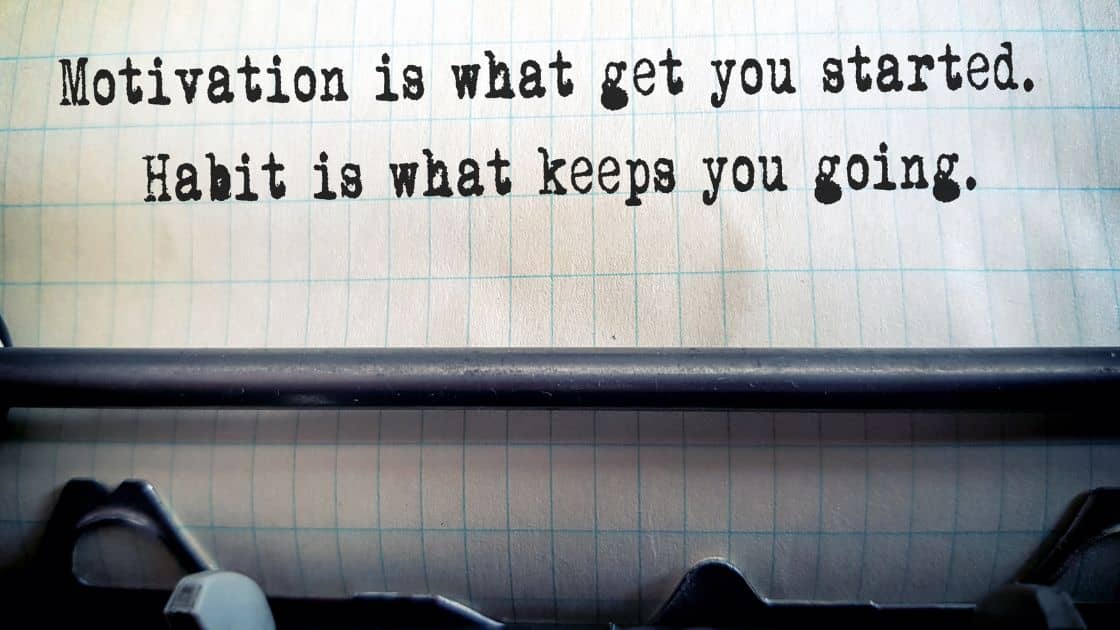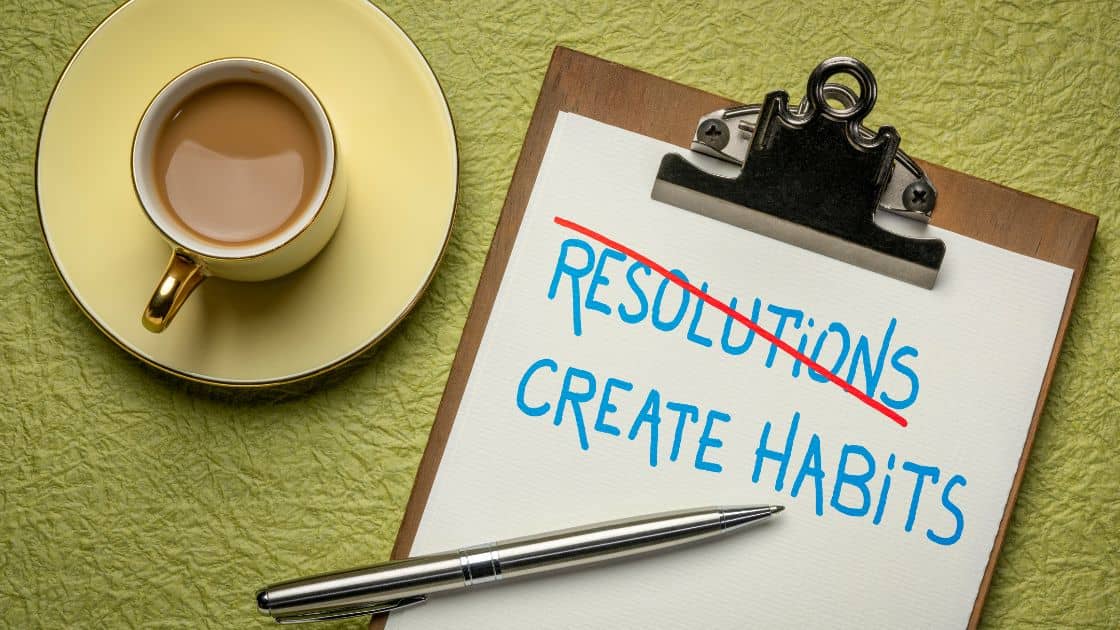In this article, we will take a deep dive into the power of habits, how they are formed, and how to break them. We will also discuss the role of motivation in changing habits and the impact of good habits on productivity. Additionally, we will provide recommendations for professional help, tools, and techniques that can assist with habit change. Real-life examples of individuals who successfully changed their habits will also be shared to inspire you to break bad habits. Let us start by understanding habits and why they matter so much in our lives.
What is the power of habits?
The power of habits lies in the fact that they shape our daily actions and behaviours. We can improve our productivity, health, and overall well-being by creating positive habits. Habits provide structure and consistency, allowing us to achieve long-term goals and make meaningful life changes.
Understanding Habits
Changing habits is essential for personal growth and behavioural transformation. Specific cues trigger these automatic behaviours and profoundly impact daily life. Once formed, habits can be challenging to alter due to their ingrained nature, requiring a deep understanding of human nature.
How Habits Shape Our Behaviour
Our behaviours and actions are significantly influenced by the habits we develop, shaping our decision-making processes and overall lifestyle. The repetitive nature of habits plays a crucial role in directing behaviour and influencing the outcomes in our lives. Understanding how habits shape our behaviour is essential for personal growth and change, providing a full new understanding of human nature. Recognizing the power of habits leads to a profound insight into the vast amounts of information available on behavioural psychology and personal development.

Formation of Habits
Habits evolve through a three-step loop: cue, routine, and reward, a foundation laid out by Charles Duhigg. Understanding habit formation is pivotal as it elucidates the golden rule of habit change and the profound impact of keystone habits. These patterns are deeply rooted in neurological processes and automatic responses, shaping behaviour and decision-making. The power of habit formation offers a whole new understanding of human nature and influences life outcomes, including the emergence of craving.
Role of Routine in Habit Formation
A consistent routine plays a pivotal role in shaping and maintaining new habits. Routines provide the structure and consistency necessary for habit formation, influencing behaviour over time. Embracing healthy routines fosters the development of positive, long-lasting habits, exemplifying the power of habit formation. Individuals can cultivate the right habits by intentionally embedding purposeful routines, leading to personal growth and positive change.
Reward System and Its Influence on Habits
Understanding the profound impact of rewards on behaviour is important in habit formation. The brain’s response to rewards and positive reinforcement reinforces habit loops and behavioural patterns. Effective habit formation relies on associating routines with meaningful rewards, enhancing the power of habits. The neurological impact of rewards on behaviour amplifies the influence of rewards on habits, shaping and reinforcing behavioural patterns. This provides a full new understanding of human nature and the vast amounts of information available regarding the power of habit formation and behaviour modification.

Breaking Bad Habits
Identifying detrimental behaviours is the initial step toward personal growth. Comprehending the science behind changing habits is crucial for successful transformation. Proactively disrupting the habit loop and substituting negative routines (with new, more positive ones) is imperative for habit change. Conquering bad habits involves a deliberate approach.
Identifying Bad Habits
Recognizing repetitive behaviours hindering personal progress is key to identifying bad habits. Acknowledging and understanding detrimental habits marks the beginning of habit change. It involves introspection and self-awareness of recurring negative patterns. Focusing on identification empowers individuals to confront negative behaviours, which is crucial for self-improvement and change. The power of habits, when channelled positively, enables individuals to overcome bad habits.
Role of Motivation in Changing Habits
Cultivating and harnessing motivation is vital for breaking bad habits and fostering personal growth. Motivation comes from doing… it’s not that some people just have it and some people do not. Achieving successful habit change requires high motivation and commitment, but motivation usually needs to be built and cultivated, it does not happen naturally for many people. The role of motivation in habit change cannot be overstated, as it propels individuals towards transformative behavioural shifts, creating a lasting impact on personal development.
Understanding the Psychology of Motivation
Motivation is a complex psychological construct that has been studied for decades. It refers to the driving force that inspires individuals to act in certain ways or pursue specific goals. Understanding what motivates people can be beneficial in various contexts, from personal development to organizational management. Key factors influencing motivation include intrinsic and extrinsic rewards, goal setting, self-efficacy, and social support. By examining these factors and their interplay, we can gain insights into cultivating and sustaining motivation in ourselves and others.
Strategies for Maintaining Motivation
Maintaining motivation can be a challenge, but there are several strategies you can employ to stay driven and focused. Here are some effective strategies that help sustain motivation over time and boost motivation through habit formation:
- Set achievable goals that are specific, measurable, and relevant to your larger aspirations. Breaking down bigger goals into smaller milestones can make them more manageable and less overwhelming.
- Cultivate a positive mindset by focusing on the benefits of achieving your goals rather than dwelling on potential obstacles or setbacks. Surrounding yourself with supportive people who encourage and inspire you can also be beneficial in maintaining motivation. Find rewards that motivate you, like the thought of having your coffee if you get up and get through the shower or pack your lunch.
- Making a plan for overcoming obstacles and staying on track when facing distractions or competing priorities is also essential. By proactively anticipating challenges and having a plan to address them, you’ll be better equipped to maintain momentum toward your goals.
- Taking care of your physical health through regular exercise, healthy eating habits, and adequate rest can also significantly impact your mental state and overall motivation. By prioritizing self-care, you’ll have the energy and focus needed to stay motivated and succeed.
Learn to leverage habits for long-term motivation and explore techniques for maintaining motivation through habit change. Gain valuable insights into habit-based strategies for continuous motivation, empowering you to stay focused and driven. Maintaining motivation becomes attainable with the right habits in place.

Habits and Productivity
Habits play a crucial role in our productivity, either positively or negatively. Bad habits such as procrastination, multitasking, and excessive social media use can hinder our ability to complete tasks efficiently. On the other hand, good habits such as setting realistic goals, prioritizing tasks, and taking breaks can boost productivity.
- For example, setting a goal to complete a specific task within a designated time frame and working on it uninterrupted can increase focus and efficiency.
- Taking breaks between tasks can also help prevent burnout and improve overall productivity.
By identifying and breaking bad habits while cultivating good ones, we can unleash the power of habits to enhance our productivity and achieve our goals. The right habits can be transformative, leading to improved performance in various aspects of life.
How Good Habits Contribute to Efficiency
Efficiency is greatly enhanced through the cultivation of good habits. Positive habits profoundly impact efficiency, streamlining processes and driving consistent high-level performance. They contribute to sustained efficiency by optimizing work routines and workflows. By understanding how good habits can boost efficiency, individuals can succeed through improved time management and increased productivity.
Keystone Habits and Their Impact
Keystone habits, as popularized by “The Power of Habit” author Charles Duhigg, are foundational routines that have the power to spark widespread positive changes across various areas of life, including building revolutionary companies and social movements. These small yet powerful habits can create a ripple effect, leading to significant transformations and a new understanding of human nature with penetrating intelligence. Understanding and cultivating these right habits can lead to exceptional outcomes and vast information on human behaviour.
Professional Help, Tools and Techniques for Changing Habits
Seeking professional assistance for habit change offers invaluable benefits. Effective tools and techniques play a crucial role in facilitating habit change. Experts provide valuable guidance and support individuals through evidence-based approaches for successful habit change. Psychology plays a vital role in understanding human behaviour and addressing ingrained habits. Individuals can experience a whole new understanding of human nature with the right habits. The vast amounts of information enable people to make informed decisions about their habits and overall well-being.
How a Psychologist, Social Worker or Psychotherapist Can Help Habit Change
Mental health professionals can help people change habits using smart strategies. They know much about human nature and use this knowledge to offer valuable support. They can help anyone, from athletes to hospital patients, adopt healthy habits. They are good at changing bad habits and even changing entire companies. Psychologists are kind and skilled, making them essential for habit change success.
Recommended Books and Online Resources
A good recommendation is “The Power of Habit, ” a book by Charles Duhigg, a New York Times reporter. The book explores the science behind habit creation and reformation and has been a best-seller in The New York Times and Amazon. Duhigg takes readers on a journey to the edge of scientific discoveries that explain why habits exist and how they can be changed. In the past 20 years, hundreds of new studies have been conducted on the “intricate ballet” of habits, where neuroscientists expertly digest and present in an engaging read.
Other highly recommended authors are:
- Stephen R. Covey’s “The 7 Habits Of Highly Effective People“;
- Gretchen Rubin’s “Better Than Before” and “Febreze” offer deep insights into habit formation;
- “Rewire” by Richard O’Connor delves into the psychology of habits;
- Roy Baumeister’s “Willpower” explores the science behind willpower and self-control;
- Loretta Breuning’s “Habits Of A Happy Brain” provides a new understanding of human nature and how habits shape our lives;
- B.J. Fogg’s “Tiny Habits“.
Can you break your bad habits and form good ones?
Yes, it is possible to break bad habits and form good ones. However, it requires time, effort, and commitment. One effective way to do this is by identifying the triggers that lead to your bad habits and replacing them with healthier alternatives. Setting realistic goals, tracking progress, and rewarding yourself for positive behaviour changes is also important. Consistency is key in forming new habits, so it’s essential to stick with it even when it becomes difficult. With dedication and persistence, anyone can break their bad habits and develop healthier ones.
Inspiring Stories of People Who Changed Their Habits
The impact of habits on our lives cannot be overstated. From individuals to companies, the right habits can lead to exceptional results. For instance, the success of companies like Amazon and Apple can be attributed to their focus on habits that drive innovation and customer satisfaction. On a personal level, individuals who have quit smoking or lose weight have done so by creating new, positive habits to replace the negative ones. These examples and countless others illustrate the transformative power of habits and the importance of focusing on the right ones for success.
The success of Olympic Swimmer Michael Phelps
Michael Phelps is a perfect example of how having a routine can lead to success. Even when he was feeling demotivated, he sought the help of a sports psychologist to get back on track. By making it a habit to prioritize both his mental readiness and physical training, Phelps was able to break world records and win multiple Olympic gold medals. His journey demonstrates that changing habits is hard, but significant improvements and remarkable achievements are possible with the right motivation and support.
Starbucks CEO Howard Schultz
Starbucks CEO Howard Schultz’s success can be attributed to his ability to tap into the power of habits. By recognizing the importance of habits in shaping behaviour, Schultz was able to implement several key habits that ultimately led to the success of Starbucks. For example, Schultz made it a habit to visit Starbucks locations and engage with customers regularly, ensuring he was always in touch with the company’s core values and vision. Additionally, Schultz made it a habit to prioritize employee satisfaction, recognizing that happy employees lead to happy customers. By leveraging the power of habits, Howard Schultz created a culture of excellence at Starbucks that continues to thrive.
Target Superstores
Target Superstore is a prime example of a company that has leveraged the power of habits to achieve success. By creating efficiency and customer satisfaction habits, Target has become a go-to destination for shoppers across the United States. When customers enter the store, they are greeted by friendly employees and a well-organized layout that encourages browsing and purchasing. Target has also developed a habit of constantly updating and improving its product offerings, ensuring customers always have access to the latest and greatest products. Target has become a leader in the retail industry by focusing on creating positive habits and continues to attract loyal customers year after year.
Alcoa
Alcoa’s former CEO, Paul O’Neill, strongly believed in the power of habits. He took over the struggling aluminum company in the 1980s and immediately set out to change its culture. O’Neill knew that to turn around the company’s fortunes, he needed to instill new habits in his employees. He started by focusing on worker safety, insisting that every employee take responsibility for their safety and the safety of their colleagues. This new habit of safety awareness soon spread throughout the company, significantly decreasing workplace accidents.
O’Neill’s focus on habits didn’t stop there. He also implemented a new habit of transparency, insisting that all employees be honest and forthright in their dealings with each other and customers. This habit of transparency helped build trust within the company and with customers, increasing sales and profitability.
Rick Warren
Warren, a renowned pastor and author, has made it a habit to prioritize his time and focus on his goals. He has a daily routine that he follows religiously, which includes waking up early, exercising, and spending time in prayer and meditation. By consistently sticking to this routine, Warren has achieved great success in his career and personal life. His habits help him stay focused and on track, allowing him to accomplish his goals and positively impact the world. The principles taught at Rick Warren’s Saddleback Church have proven transformative. By breaking bad habits and replacing them with positive ones, anyone can unleash the power of habits and achieve their full potential.
These stories offer valuable insights into the power of habit change and inspire others to take control of their lives. From exceptional children to revolutionary companies, their stories echo the exhilarating argument for embracing change and shaping destiny.
You can achieve remarkable outcomes by overcoming deep-rooted habits and inspiring personal growth. These narratives reveal the profound impact of determination on successful habit change.

Conclusion
Changing habits is difficult but possible with the right mindset and strategies. It all starts with understanding the power of habits and how they shape our behaviour. By identifying our bad habits and the triggers that lead to them, we can begin to break free from their grip. Motivation is crucial in this process, as is creating new routines and finding alternative rewards. Remember that changing habits takes time and effort, but the results are worth it. Surrounding yourself with supportive resources and seeking professional help can also greatly enhance your chances of success. So, take the first step towards breaking your bad habits and start building healthier, more productive ones today.






